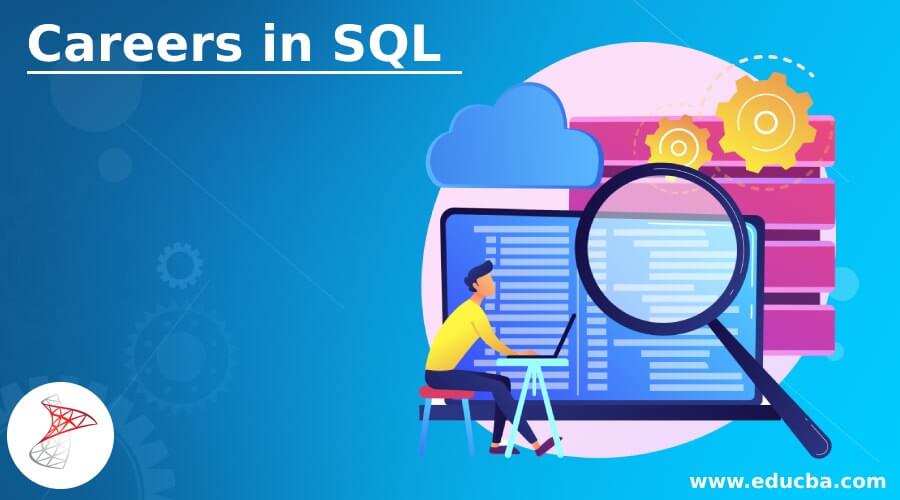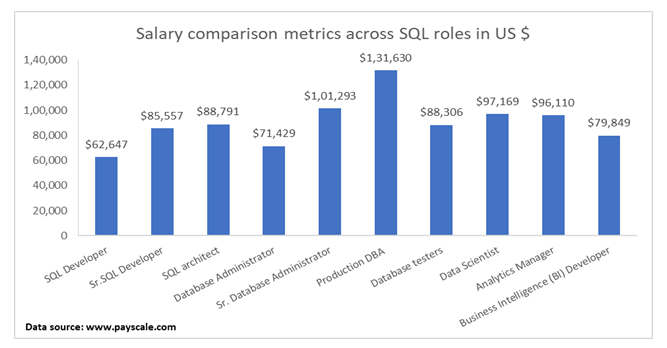Updated May 2, 2023
Introduction to Careers in SQL
SQL means structured query and domain-specific language used to communicate and manipulate data stored in RDBMS databases. SQL is spread across many domains and has many concepts and theories. To start a career in this, one should master all SQL concepts. Careers in SQL have many roles to play in a Data concentric organization, so SQL professionals with analytical thinking and applying them to SQL have high demand in today’s software market. For candidates passionate about data and its challenges, then SQL is the career they should pursue. We can find many jobs in a market related to SQL as SQL is found on-premises and in the cloud, creating a high need for careers in SQL professionals. Technology is moving forward today, but SQL skills will last forever and take you to the desired goals.
Education to Improve Careers in SQL
Careers in SQL job requirements and mandatory qualifications may differ from company to company based on client requirements and job type, time, and money(ROI) for SQL roles.
- Future SQL professionals should have a bachelor’s or Master’s degree in computer science, computer information systems (CIS), or IT-related major Specialization like B. Tech/B. E/MCA.
- Certification in Database Administrator (DBA), Database Developer, Database Designer/Database Architect, etc., will add more value-adding to the education.
- An additional recommendation is to learn PL/SQL and ETL tools, which have more demand in the market.
Career Path in SQL
Out of the most popular databases, SQL Server stands in third place. Millions of SQL Server databases are available, and many SQL professionals work with SQL databases/Servers continuously.
SQL career paths include SQL Server Database Administration, and Development, Business intelligence professionals, Data science, and engineering will come in successful SQL career path.
DBA career has high demand out of all SQL career roles. We have different types of DBA career paths, like Development DBA, Production DBA, and Infrastructure DBA.
Job Positions or Application Areas
- Database Administrator (DBA) – A person responsible for administration and maintains a SQL Server database.
- Database Developer – A Database Developer’s primary duties are to design and implement databases.
- Database Testers – A database tester’s primary job role is to validate the database for the right data loaded.
- Data Scientist – It’s a new job to deal with Big data, and responsible for analyzing, predicting, and mining data to drive the business forward.
- ETL Developer – ETL developer will work on extracting and transforming data from databases.
- Data Application Interface Developer – Who works with different programming languages like ASP.Net, C #, and Java needs to connect to databases.
- BI Application Developer –Business Intelligence Developer is a high-demand job related to Data Warehousing, Reporting, and data transformations and dealing with query languages to analyze different data cubes and marts.
- BI Administrator – BI Administrator is responsible for executing ETL jobs and publishing and monitoring Data Warehousing reports, sometimes comparing data with SQL database for backend validation.
- Big Data Expert – Big Data expert works with Big data tools like Hadoop, Spark, Hive, etc., which requires SQL proficiency.
- Cloud Database Expert – Many cloud databases like AWS, GCC, and Microsoft Azure need SQL professionals.
- Database Migration Engineer – He migrates data into an SQL server from different sources.
- Data Analyst – Main responsibility is creating key performance indicators to analyze data.
- BI Reporting Engineer – Builds and executes business reports and metrics using different BI tools like Microstrategy, Tableau, Cognos, and Panorama Necto Business Intelligence solutions which build in SQL databases reporting concept.
- BI Solution Architect (SME) – Provides solutions for a business problem by analyzing data from various sources like SQL.
- NoSQL DBA – There are many no SQL databases like MongoDB, etc., but SQL skills must apply to work with NoSQL administration.
- Big Data Architect – In today’s world, data is everywhere in huge volume, velocity & different verity, so big data architect provides solutions to handle data in large numbers.
Recommended Courses
- JSON Program
- Program on Axure
- OmniGraffle Pro Training
- Online Course on Agility.JS
Salary (US Data)
According to current salary data as on March 2018, SQL professionals get salaries as per the company and the roles they work on. The average salary of SQL professionals varies based on experience and the roles they play in different organizations.
Salary may be paid hourly for contractor SQL professionals and Annually for permanent SQL professionals.
Experienced SQL professionals can negotiate the salary, but remember that SQL skills should be on top when negotiating your salary.
The below data chart gives SQL professional salary comparison metrics across roles.
The above Salary comparison is based on data analysis performed across payscale.com salary data. Data displayed in the graph is for the Country United States, and its in Currency USD and SQL salary data as on 19 Mar 2018.
Conclusion – Careers in SQL
The Career path points mentioned above helps SQL professionals to plan their career with high expectations and a good salary range. As per the U.S. Bureau of Labor Statistics (BLS), all IT programming jobs will grow rapidly. As we are in a Data-driven world where social media, Business forecast, and Predictive analysis are in high demand across the data world so there is a huge increase in the number of websites tied along with social media platforms like Facebook, Twitter, LinkedIn, etc. generating a large volume of data ending up in complex data warehouses will increase the growth for SQL developer jobs.
It is a high-demand skill in the data-driven computer industry. It will be there until the end of the world because we all live with data everywhere, so SQL professionals’ demand will not reduce. As organizations deal with daily petabytes of structured or unstructured data from different media, it all ends up with data, so it is much needed for data analysis and preparing data for future predictions. Keep in mind as technologies emerge, SQL interfaces and methods may get improvised, so be in and live in SQL technology to be on top of SQL career path.
Recommended Articles
This has been a guide to Careers in SQL. Here we have discussed the introduction, education, career path, job positions, and salary. You may also look at the following article to learn more –




